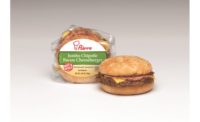Ruby Tuesday Triples Burger Appeal
By Jesse Rotman
Responding to the growing trend by casual-dining and fast-food restaurants to serve bigger and better hamburgers, the Ruby Tuesday chain is making a name for itself with a new promotional menu item known as the Triple Prime Burger.
It’s also keeping pace with diners’ increased interest in the healthy side of the business — its signature salad bar. Ruby Tuesday is well-known for its salad bar, a bountiful lineup of such offerings as vegetables, seeds, cheeses, macaroni salads and dressings.
Meanwhile, the company’s “Premium Burgers” menu category spotlights the Triple Prime specialty along with a Jumbo Lump Crab Burger.
The juicy, seven-ounce Triple Prime Burger is made from a measured mix of prime tenderloin, prime Ribeye, and prime sirloin blended fresh and grilled for a taste treat. The specialty burger already has increased sales for the company since its debut in July, according to a company representative.
The Triple Prime Burger was developed in-house by the company’s Culinary Department. Its mission was to focus consumer attention on Ruby Tuesday’s wide choice of 16 different “handcrafted” burgers.
This lineup includes burgers made from range-fed bison, ground turkey, lean chicken breasts and tasty vegetables, as well as 100 percent choice USDA ground beef. These items can be garnished with applewood-smoked bacon, various cheeses, red onions, lettuce and tomatoes.
“Our July menu, including our new Triple Prime Burger and our premium Jumbo Lump Crab Cake, has been well-received. Our focus on freshness and quality programs continues with the rollout of our October menu during the second quarter,” stated Sandy Beall, Ruby Tuesday chairman and CEO.
“Our gracious hospitality initiatives continue to roll with emphasis on quality, passion and pride in all that we do.”
The menu introduced this summer also included a reworking of its basic food formulations. Fresh meat was introduced to replace frozen, and the company also adopted a tight timeline for beef deliveries.
All fresh ground beef must now adhere to an 18-day window from butchering to end-user consumption. When the beef arrives at a restaurant location, about five days remain in the schedule for the restaurant to cook and sell the burgers. At least some of the restaurant’s beef comes from the Performance Food Group of Richmond, Va.
Industry experts say the casual dining segment is highly competitive and affected by changing consumer tastes. Ruby Tuesday is trying to differentiate itself by emphasizing high-quality foods and spending more on advertising while abandoning a couponing strategy that proved ineffective at improving sales.
The company spent $45 million on advertising last year, and franchisees spent an additional $15 million. Still, Ruby Tuesday spends only a fraction of what competitors such as Applebee’s spend, and the Ruby Tuesday brand isn’t yet as well-recognized.
With franchise locations that range from Iceland to India and South America, Ruby Tuesday is one of the world’s leading casual-dining brands with more than 900 restaurants. About 50 new sites are expected to be added in 2006.
Company sales results for 2005 were $1.1 billion for this public company (ticker symbol RI) founded in 1972. Headquartered in Maryville, Tenn., the chain has more than 16,300 employees throughout its far-flung operations.
Jesse Rotman is a freelance writer based in the Chicagoland area.


Report Abusive Comment